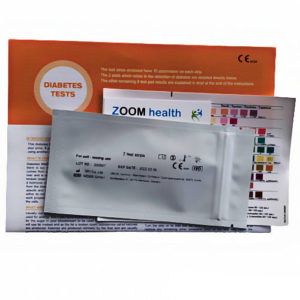A recent study published in the JAMA Network Open journal has revealed a substantial increase in the number of children and teenagers diagnosed with type 1 diabetes since the Covid-19 pandemic began. Researchers examined data from various countries, including the UK, and found that the incidence rate of childhood type 1 diabetes rose by 14% during the first year of the pandemic compared to pre-Covid levels, and by 27% in the second year. While some of the increase can be attributed to catch-up from backlogs and delayed diagnoses when health services were shut down, it does not account for all of the newly diagnosed cases.
The underlying cause of the rise in type 1 diabetes cases remains unclear, but researchers have put forward a few theories. One possibility is that Covid-19 can trigger an autoimmune reaction in some children, increasing the risk of diabetes. However, not all studies have found evidence to support this theory. Another hypothesis is that reduced exposure to germs during lockdowns and physical distancing measures may have deprived children of some protection against various conditions, including diabetes. It is believed that exposure to certain germs in childhood can help guard against such diseases.
The study’s authors, from the University of Toronto, emphasize the need for more resources and support for the growing number of children and adolescents affected by type 1 diabetes, regardless of the cause. Type 1 diabetes requires individuals to closely monitor their blood sugar levels and take insulin to control it, as their bodies cannot do this automatically. It occurs in both children and adults, and while the causes are not fully known, there is currently no cure.
Speaking to the BBC, Hilary Nathan, the Policy Director at the type 1 diabetes charity JDRFUK, highlights the importance of recognizing the symptoms of type 1 diabetes, including tiredness, thirst, frequent urination, weight loss, and increasing thinness. Early diagnosis and swift treatment can be life-saving. The article includes the story of Theo, a nine-year-old boy who was diagnosed with type 1 diabetes a year ago, a few months after recovering from Covid-19. His mother initially mistook the symptoms for a misdiagnosis, but they caught it early and Theo now manages his diabetes with an insulin pump.
Dr. Faye Riley from Diabetes UK comments that research worldwide has identified higher-than-expected numbers of diabetes diagnoses following the Covid-19 pandemic. Future studies examining longer-term trends will be crucial in understanding the impact of the pandemic and identifying the range of factors that could be contributing to this phenomenon. It is not yet fully understood why there has been an increase in diabetes diagnoses, but several theories have emerged.
One possibility is that the stress and anxiety caused by the pandemic have led to unhealthy lifestyle changes, such as poor diet and lack of physical activity. These factors are known to increase the risk of developing Type 2 diabetes. Additionally, certain medications used to treat Covid-19 may also have an impact on blood sugar levels and could potentially trigger the onset of diabetes in susceptible individuals.
Another consideration is the impact of social isolation and reduced access to healthcare services during lockdowns. Many individuals with pre-existing risk factors for diabetes may have delayed regular check-ups and screenings, leading to delayed diagnoses. Moreover, the limited availability of fresh and healthy food options during lockdowns could have contributed to an increase in unhealthy eating habits, further increasing the risk of diabetes.
Furthermore, the direct impact of the SARS-CoV-2 virus on the pancreas, the organ responsible for producing insulin, cannot be ruled out. Research has suggested that the virus may directly infect pancreatic cells, leading to impaired insulin production and potentially triggering diabetes in some individuals.
It is also possible that the increase in diabetes diagnoses is simply a result of improved detection methods or enhanced screening efforts during the pandemic. As individuals become more health-conscious and prioritize their overall well-being, they may be more likely to seek medical attention and undergo diabetes screenings.
In order to fully understand the reasons behind the increased diabetes diagnoses, more research is needed. Long-term studies that compare pre-pandemic and post-pandemic data will be instrumental in determining the true impact of Covid-19 on diabetes rates. By identifying the underlying factors contributing to this increase, healthcare professionals can develop targeted interventions and preventive measures to mitigate the long-term consequences of the pandemic on diabetes prevalence.
In the meantime, organizations like Diabetes UK are working tirelessly to raise awareness about the importance of healthy lifestyle choices, regular check-ups, and diabetes screenings. By empowering individuals with knowledge and support, they aim to prevent the further escalation of diabetes cases and promote overall well-being amidst the challenging circumstances posed by the pandemic.
Diabetes Home Testing Kit from Zoom Health
Introducing our Urine Test Strips for Diabetes – Glucose Testing Kit. This essential test kit is designed to detect the presence of glucose and ketones in urine, allowing for early identification of diabetes before any noticeable symptoms occur.
Detecting diabetes at an early stage is crucial as it allows for prompt treatment and helps reduce the risk of complications. Our test kit is simple to use and provides results in just 60 seconds, providing you with quick and accurate information about your health.
Each pack contains 2 testing strips. If you obtain an abnormal result with the first strip, there is an additional strip included for a repeated test. This ensures reliability and peace of mind when using our product.
The test strips are equipped with 10 parameters on each strip. The Glucose and Ketone pads specifically target the detection of diabetes while the other 8 test pad results are explained in brief at the end of the instructions. This comprehensive approach allows for a thorough understanding of your overall health.
Packaged in a convenient foil, our test kit ensures the longevity of the strips. Once the pouch has been opened, the remaining strip remains stable for up to 30 days as long as the pouch is immediately re-sealed. This feature provides flexibility and convenience, making it easy to use the test kit whenever you need it.
Take control of your health with our Urine Test Strips for Diabetes – Glucose Testing Kit. Catching diabetes early can make a significant difference in your well-being, so don’t wait! Order your kit today and start monitoring your health with ease and confidence.
Photo by Zoom Health
Zoom Health is a leading UK supplier of Home Health Tests and Earplugs
This post was originally published in June 2023.






